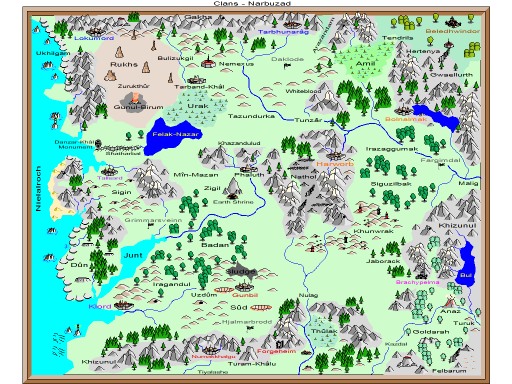
| Category | Wars | |||
| Period | 1670 - 1685 | |||
| Theater | Clans | |||
| Belligerents |
| |||
| Map | Narbuzad |
In the 1600s, tracks were being laid for the Tarbhunarâg Line. This was the third spoke of the Kibar-Kûn, a rail network destined to link all of the region's great dwarven holds. The Tarbhunarâg Line began at Bolnalmak, then north towards Tarbhunarâg. Across untamed lands, sometimes claimed by wild tribes or intelligent monsters, it was slow, costly and deadly work. The Tarbhunarâg Line was projected to be very costly. Investors were projected to not see a return for nearly a decade. Few wanted to back the project. As a result, work crews had too few security forces. Those behind the project needed support, otherwise it was projected to take twice as long to complete. Phorngoad Rail, the company behind Kibar-Kûn and its spokes, made a business decision, instigating a conflict, and hopefully creating a national need for the Tarbhunarâg Line.
Fighting began with heavy logging in the Gwaellurth. North of the Fargimdal capital Bolnalmak, the lumber of this forest was needed to build train tracks, bridges, living areas, new towns, and feeding Phorngoad Rail's great hungry armored locomotives. Beledhwindor, an elven city of Rúmil Empire, took offense with the reckless, and by their laws, illegal use of clear cutting. They were already disgusted with the pall of smoke hanging over Clan cities. Now with each passing year, they saw more and more of it being carried across the land in noisy soot belching iron hulks. Following the normal Rúmil diplomatic doctrine, they fought before opening a diplomatic discussion. Phorngoad Rail, influential in Fargimdal politics, prolonged the war with their actions. They were not alone, Fargimdal's generals yearned for another war. It was how they got status and honor. Others groups could make big profits feeding a hungry war. In the war's second year, a large bloc voted in favor of protecting and backing the Tarbhunarâg Line. Phorngoad Rail had some of the best lawyers and accountants in the land. They tied the logging company in Gwaellurth with the Tarbhunarâg Line Company, making it difficult for Fargimdal to extract themselves from the conflict. Luckily for both sides, the war ended with the birth of a god.
One of the most famous heroes of this war a wood elf named Aredhel. No friend of Rúmil, she was here to battle the ecological devastation taking place. Perhaps one of the most famous of the land's Nature Protectorates, she died alongside thousands of others. Upon her last mortal breath, she ascended to godhood. This divine happening, a miracle, blessed Gwaellurth's plant-life with great regeneration. This blessing is a powerful regrowth magic that occurs every month. Any trees or vegetation that has been killed, regrows over the next couple of weeks. As a result, Fargimdal's lumber companies have a replenishing resource of timber, and one less reason for conflict with their neighbors. The Peace of Aredhel was signed on 17 Bliss 1685, ending fifteen years of conflict.